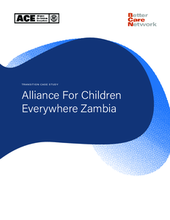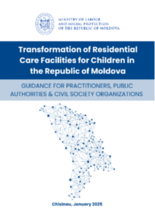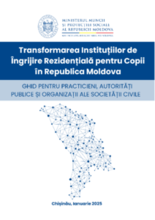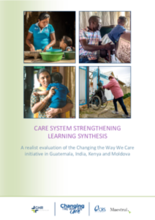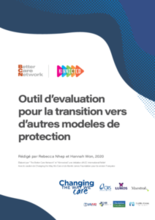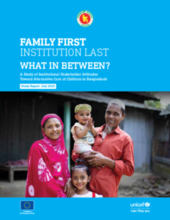Displaying 1 - 10 of 692
ACE Zambia, founded in 1998 as a faith-based organization supporting orphans and vulnerable children, gradually shifted from operating multiple residential care facilities toward strengthening family- and community-based services after recognizing the harms of long-term institutionalization. Between 2014 and 2025, the organization closed all residential homes, expanded preventative and family-focused programs, and ultimately increased its reach by supporting far more children in safe family settings using the same level of resources.
The Moldova Transformation Guidance aims to support the transformation process of residential care facilities (RCF) to models that promote family support and community-based services, or to safely close them and redirect their resources. National and local authorities can use this guidance to design, plan, budget, communicate, and coordinate transformation at both individual and system levels.
This report presents findings from an evaluation by Changing the Way We Care (CTWWC) that used a realist approach to examine how care reform progressed in Guatemala, India, Kenya, and Moldova across five key system components. It identifies advocacy, government ownership, collaboration, and capacity-building as major drivers of change and offers recommendations for governments and partners to embed family care in national systems, strengthen coordination and workforce capacity, and sustain reforms through evidence, shared learning, and long-term commitment.
Cet outil vise à aider les praticiens à atteindre les objectifs suivants lorsqu'ils fournissent un soutien technique aux institutions en transition :
Drawing on the panel and discussions at the Global Study’s Global Conference on Justice for Children Deprived of Liberty 2024 Geneva event, this chapter outlines key elements required for deinstitutionalisation for effective children’s care reforms that are accountable to children. It proposes a two-pronged approach of systems change reforms reinforced by accountability mechanisms to achieve this for children in institutions specifically for care purposes.
This study is complementary to the alternative care assessment and explores the perceptions and attitudes of policymakers, judges, and frontline child protection practitioners toward alternative care in Bangladesh. It finds broad consensus that children thrive best in families, yet institutional care remains the default due to the lack of structured alternatives.
This report presents the main findings, conclusions, and recommendations of a formative and summative evaluation of the childcare and deinstitutionalisation reforms in North Macedonia for the period of 2009 2022. The evaluation was commissioned by the United Nations Children’s Fund (UNICEF) Europe and Central Asia Region Office (ECARO), as part of its multi-country evaluation of the impact of national child care reforms across eight1 countries in Europe and Central Asia and was conducted by Coram International.

